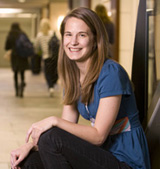 Karen Usselman Lindell ’12 has been awarded a two-year Skadden Fellowship to work at the Juvenile Law Center in Philadelphia. Lindell, who was awarded the Founders Medal for graduating first in her class, is one of 28 Skadden Fellows nationwide in the class of 2014.
Karen Usselman Lindell ’12 has been awarded a two-year Skadden Fellowship to work at the Juvenile Law Center in Philadelphia. Lindell, who was awarded the Founders Medal for graduating first in her class, is one of 28 Skadden Fellows nationwide in the class of 2014.
As a Skadden Fellow, Lindell plans to develop a legal advocacy program to help older youth with disabilities who will soon “age out” of various child and juvenile assistance programs, and who will need to transition to services that support disabled adults.
“Systems that serve children and youth and those serving adults are often separated by a deep gap,” Lindell said. “Youth with disabilities are particularly vulnerable–they need continuity of health care, educational and other services as they enter adulthood to have a meaningful chance for stability, health and success. My program will seek to improve outcomes by creating a process that helps disabled youth make the transition from juvenile support services of all types to the adult services they will need long term.”
Approximately 25 of the prestigious fellowships are awarded each year by the Skadden Foundation to highly motivated and promising recent law graduates to kickstart their careers in the public interest. The Foundation pays each Fellow’s salary and benefits during their two years of legal work at a sponsoring organization and also provides school loan repayment assistance during the fellowship term. Prospective Fellows apply in conjunction with the sponsoring organization, with which they design a project aimed at filling an unmet legal need in a creative, yet feasible, way. Skadden receives more than 500 such applications each year.
Described as “a legal Peace Corps” by the Los Angeles Times, the Skadden Fellowship program was established in 1988 by the law firm Skadden Arps Slate Meagher & Flom to celebrate its fortieth anniversary. Led since its inception by Susan Butler Plum, the program has placed nearly 700 young lawyers in positions around the country serving the poor, the elderly, the homeless, the disabled, and those deprived of civil or human rights. Vanderbilt Law School has sent six students into this elite corps, including recent graduates Elizabeth Johnston ’11, who is currently working at the Women’s Law Center in Washington, D.C., and Lauren Lowe ’09, who worked at Equip for Equality in Chicago.
Lindell was a judicial clerk for Judge Kent A. Jordan on the U.S. Court of Appeals for the Third Circuit in Wilmington, Delaware during 2012-13, and is currently serving as a clerk to Judge Eduardo C. Robreno of the U.S. District Court for the Eastern District of Pennsylvania. “When I moved to Philadelphia, I immediately started looking for a potential fellowship partner,” she said. “The Juvenile Law Center stood out. I had taken Professor [Terry] Maroney’s Juvenile Justice class at Vanderbilt, and I saw this as a great opportunity to jump into that field.”
Lindell notes that “things have gotten a lot better” for Pennsylvania’s disabled youth in recent years. “They can now stay in foster care until age 21,” she said, noting that children historically had lost services at age 18. “That presents a great opportunity if we can make the most of the additional time to make sure the adult services they need are in place before they leave foster care.”
However, she emphasizes that the stakes of failing to ensure continuity of services for disabled youth as they reach adulthood are high. “If you don’t have a plan in place while they’re still in the juvenile system, there’s a high risk these children will become homeless adults.”
One important issue Lindell hopes to address is establishing better ways to coordinate a holistic transition to adult programs and services. “Many agencies or advocacy organizations address one issue, such as education, health care or housing,” she explained. “I’ll be looking at the bigger picture and creating links between programs to make it easier to coordinate the services each individual needs.”
Lindell will begin working at the Juvenile Law Center as a Skadden Fellow in September 2014.
“I couldn’t be prouder of Karen Lindell,” said Professor Terry Maroney, who was a Skadden Fellow at the Urban Justice Center in New York City from 1999 to 2001 and now serves as director of the law school’s Social Justice Program. “And I couldn’t be more excited for the young people who will gain her as an advocate. Karen is brilliant, tenacious, and caring, and I know she will give them everything she’s got.” Maroney also spoke highly of the Juvenile Law Center, with which she has worked in the past. “It’s a perfect partnership,” she said, “and a wonderful example of what our students can achieve when they decide to put their legal training to use for the public good, and not just their own.”